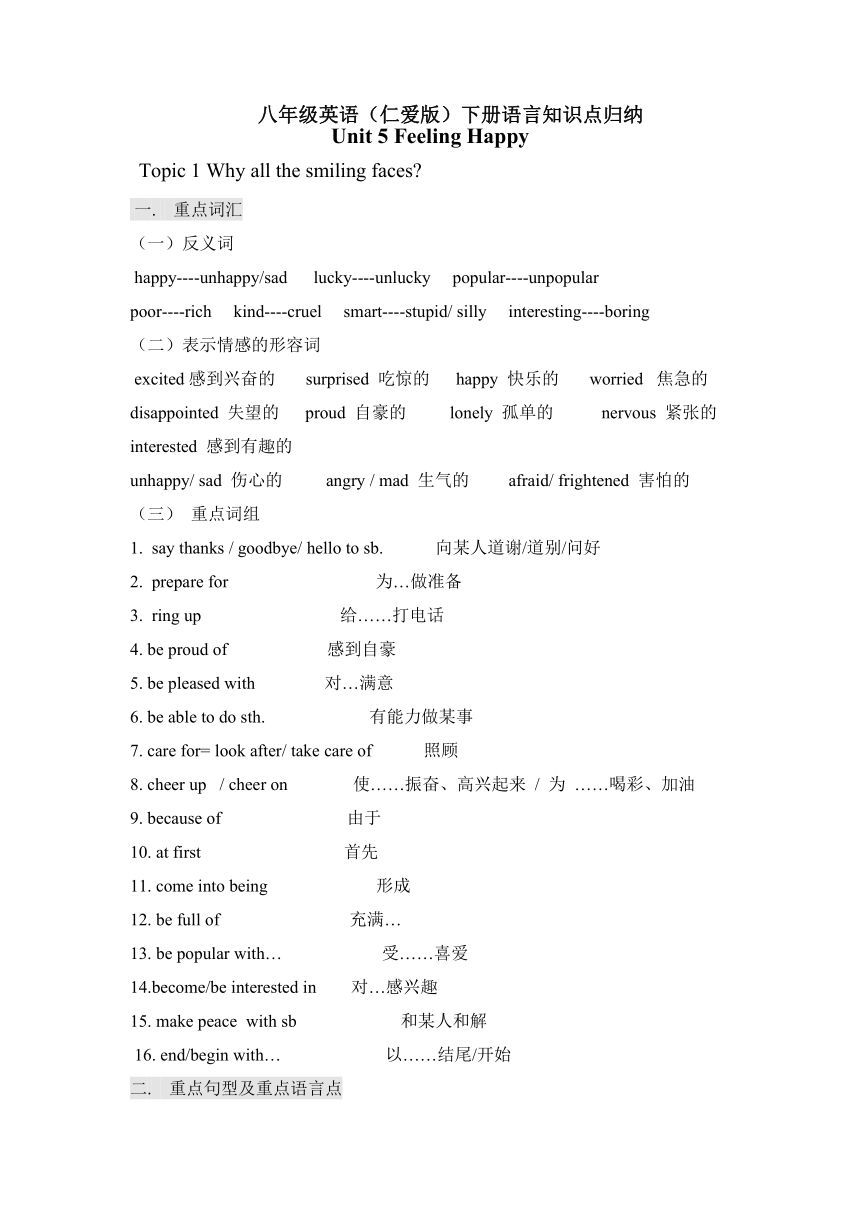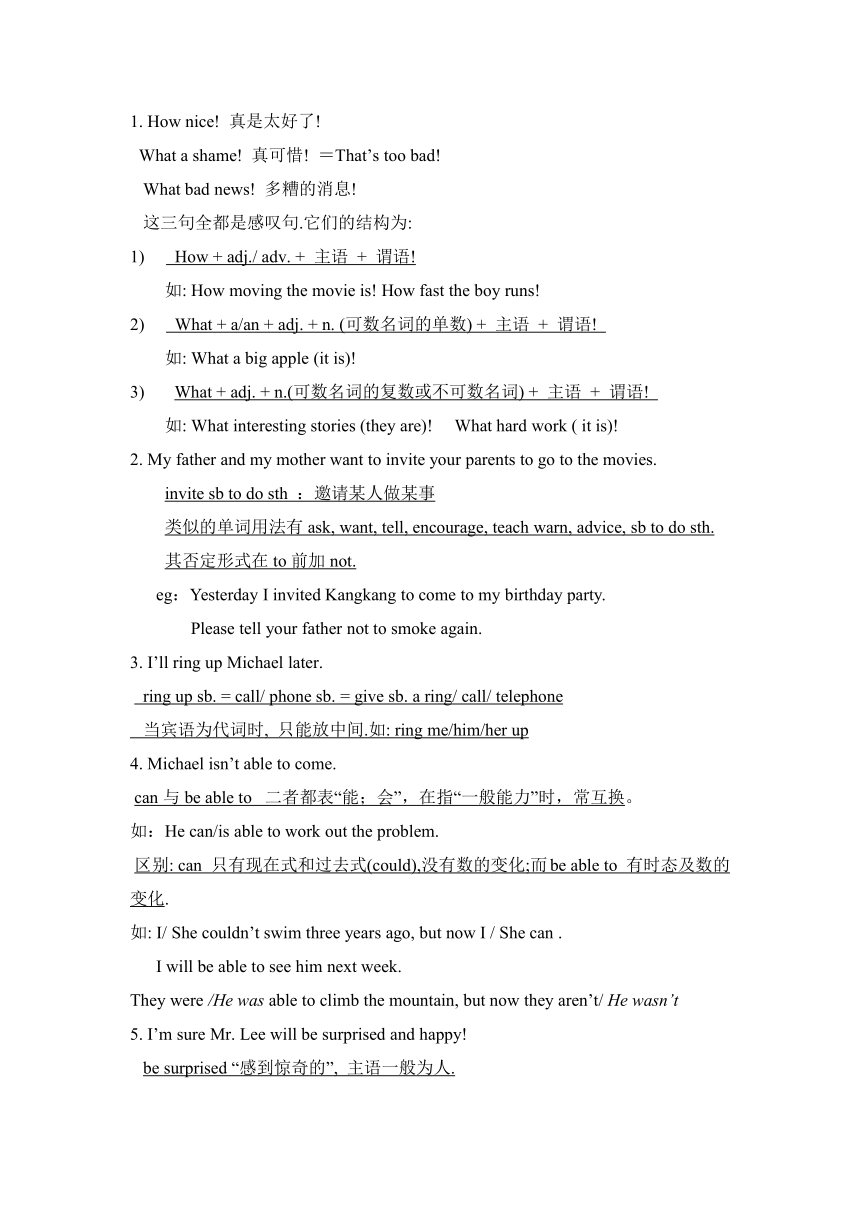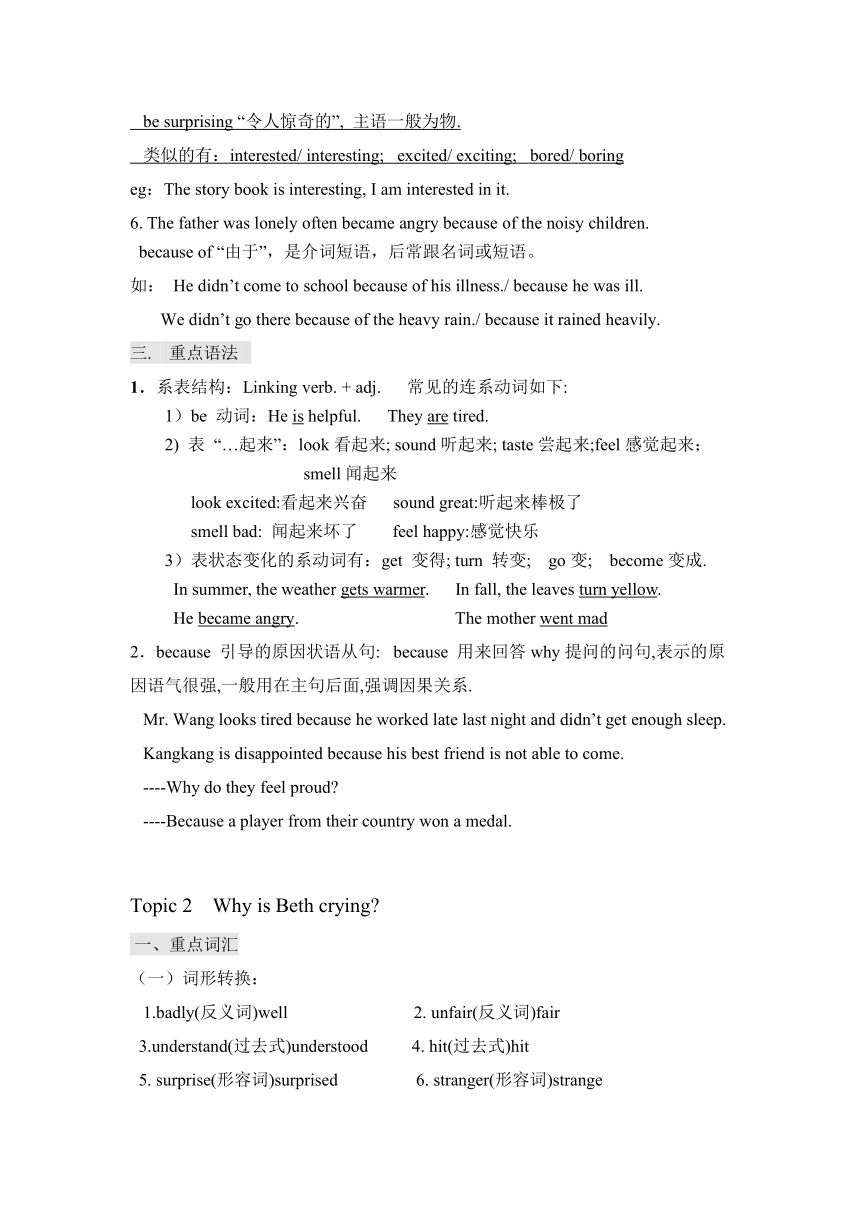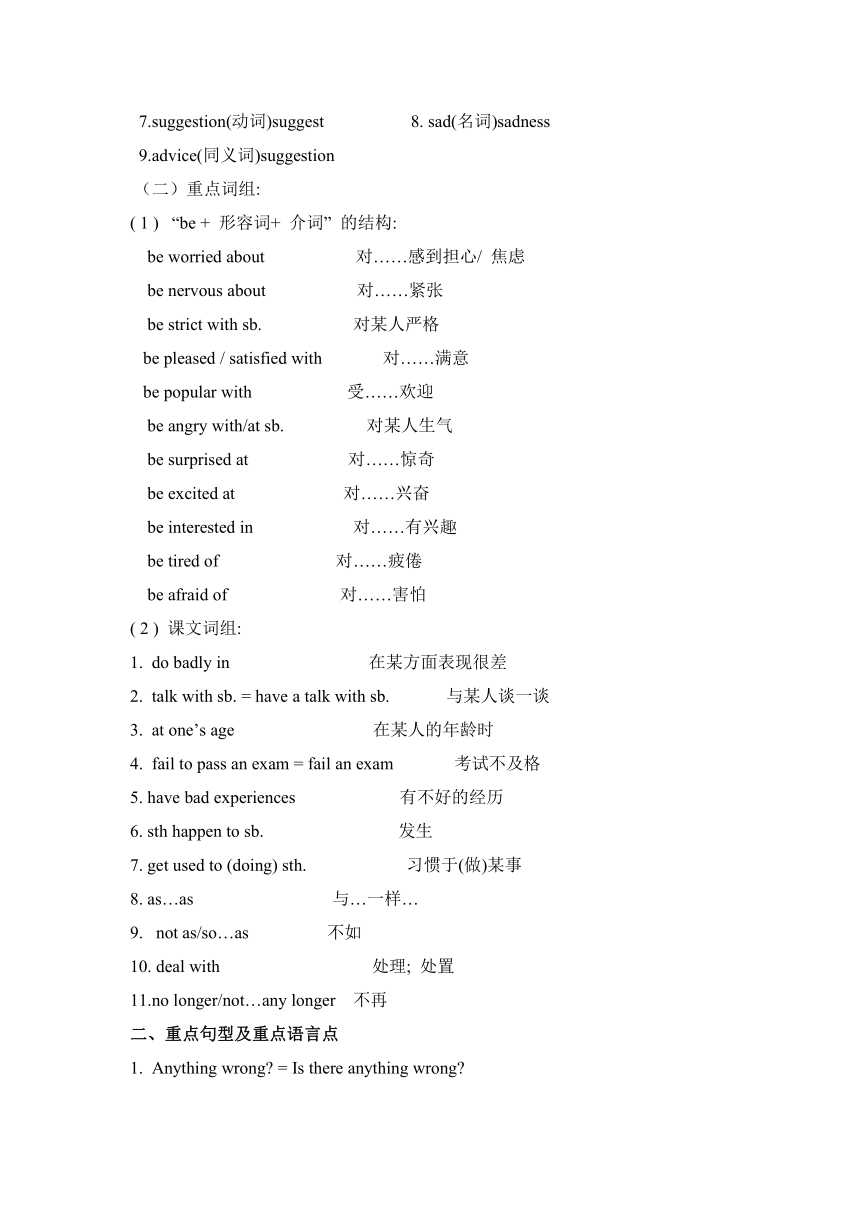Unit 5 Feeling excited语言点归纳(重点词汇+句型+知识点)
文档属性
| 名称 | Unit 5 Feeling excited语言点归纳(重点词汇+句型+知识点) |

|
|
| 格式 | zip | ||
| 文件大小 | 89.5KB | ||
| 资源类型 | 试卷 | ||
| 版本资源 | 仁爱科普版 | ||
| 科目 | 英语 | ||
| 更新时间 | 2020-06-02 00:00:00 | ||
图片预览




文档简介
八年级英语(仁爱版)下册语言知识点归纳
Unit
5
Feeling
Happy
Topic
1
Why
all
the
smiling
faces?
?一.??
重点词汇
(一)反义词
?happy----unhappy/sad????
lucky----unlucky???
popular----unpopular
poor----rich???
kind----cruel???
smart----stupid/
silly???
interesting----boring??
(二)表示情感的形容词
?excited感到兴奋的?????
surprised
吃惊的????
happy
快乐的???????worried?
焦急的?????
disappointed
失望的??????proud
自豪的????????
lonely
孤单的???????????nervous
紧张的
interested
感到有趣的
unhappy/
sad
伤心的??????????angry
/
mad
生气的???????
afraid/
frightened
害怕的??
(三)
重点词组
1.??say
thanks
/
goodbye/
hello
to
sb.??????????
向某人道谢/道别/问好
2.??prepare
for
为…做准备
3.??ring
up??????????????????????????????
给……打电话
4.
be
proud
of?????????????????????
感到自豪
5.
be
pleased
with
对…满意
6.
be
able
to
do
sth.??????????????????????
有能力做某事
7.
care
for=
look
after/
take
care
of??????????
照顾
8.
cheer
up?
/
cheer
on?????????????
使……振奋、高兴起来
/
为
……喝彩、加油
9.
because
of???????????????????????????
由于
10.
at
first???????????????????????????????
首先
11.
come
into
being???????????????????????
形成
12.
be
full
of????????????????????????????
充满…
13.
be
popular
with…?????????????????????
受……喜爱
14.become/be
interested
in
对…感兴趣
15.
make
peace??with
sb????????????????????????和某人和解
?16.
end/begin
with…??????????????????????
以……结尾/开始
二.??
重点句型及重点语言点
1.
How
nice!
真是太好了!
??What
a
shame!
真可惜!
=That’s
too
bad!
?
What
bad
news!
多糟的消息!
?
这三句全都是感叹句.它们的结构为:
1)?????
How
+
adj./
adv.
+
主语
+
谓语!
如:
How
moving
the
movie
is!
How
fast
the
boy
runs!
2)?????
What
+
a/an
+
adj.
+
n.
(可数名词的单数)
+
主语
+
谓语!
如:
What
a
big
apple
(it
is)!
3)
What
+
adj.
+
n.(可数名词的复数或不可数名词)
+
主语
+
谓语!
如:
What
interesting
stories
(they
are)!???
What
hard
work
(
it
is)!
2.
My
father
and
my
mother
want
to
invite
your
parents
to
go
to
the
movies.
invite
sb
to
do
sth
:邀请某人做某事
类似的单词用法有ask,
want,
tell,
encourage,
teach
warn,
advice,
sb
to
do
sth.
其否定形式在to前加not.
eg:Yesterday
I
invited
Kangkang
to
come
to
my
birthday
party.
Please
tell
your
father
not
to
smoke
again.
3.
I’ll
ring
up
Michael
later.
?
ring
up
sb.
=
call/
phone
sb.
=
give
sb.
a
ring/
call/
telephone
?
当宾语为代词时,
只能放中间.如:
ring
me/him/her
up
4.
Michael
isn’t
able
to
come.
?can与be
able
to?
二者都表“能;会”,在指“一般能力”时,常互换。
如:He
can/is
able
to
work
out
the
problem.
?区别:
can
只有现在式和过去式(could),没有数的变化;而be
able
to
有时态及数的变化.
如:
I/
She
couldn’t
swim
three
years
ago,
but
now
I
/
She
can
.
????
I
will
be
able
to
see
him
next
week.
They
were
/He
was
able
to
climb
the
mountain,
but
now
they
aren’t/
He
wasn’t
5.
I’m
sure
Mr.
Lee
will
be
surprised
and
happy!
?
be
surprised
“感到惊奇的”,
主语一般为人.
?
be
surprising
“令人惊奇的”,
主语一般为物.
?
类似的有:interested/
interesting;?
excited/
exciting;?
bored/
boring
eg:The
story
book
is
interesting,
I
am
interested
in
it.
6.
The
father
was
lonely
often
became
angry
because
of
the
noisy
children.
??because
of
“由于”,是介词短语,后常跟名词或短语。
如:
He
didn’t
come
to
school
because
of
his
illness./
because
he
was
ill.
?
We
didn’t
go
there
because
of
the
heavy
rain./
because
it
rained
heavily.
三.??
重点语法?
1.系表结构:Linking
verb.
+
adj.
常见的连系动词如下:
1)be
动词:He
is
helpful.
They
are
tired.
2)
表
“…起来”:look看起来;
sound听起来;
taste尝起来;feel感觉起来;
smell闻起来
look
excited:看起来兴奋
sound
great:听起来棒极了
smell
bad:
闻起来坏了
feel
happy:感觉快乐
3)表状态变化的系动词有:get
变得;
turn
转变;
go变;
become变成.
In
summer,
the
weather
gets
warmer.
In
fall,
the
leaves
turn
yellow.
He
became
angry.
The
mother
went
mad
2.because
引导的原因状语从句:?
because
用来回答why提问的问句,表示的原因语气很强,一般用在主句后面,强调因果关系.
?
Mr.
Wang
looks
tired
because
he
worked
late
last
night
and
didn’t
get
enough
sleep.
?
Kangkang
is
disappointed
because
his
best
friend
is
not
able
to
come.
?
----Why
do
they
feel
proud?
?
----Because
a
player
from
their
country
won
a
medal.
Topic
2??
Why
is
Beth
crying?
?一、重点词汇
(一)词形转换:
?
1.badly(反义词)well?????????????????
2.
unfair(反义词)fair????
3.understand(过去式)understood??????????4.
hit(过去式)hit
5.
surprise(形容词)surprised
6.
stranger(形容词)strange
7.suggestion(动词)suggest????????????
8.
sad(名词)sadness
9.advice(同义词)suggestion???????????
?(二)重点词组:
(
1
)?
“be
+
形容词+
介词”
的结构:
??
be
worried
about??
?????????????????对……感到担心/
焦虑
??
be
nervous
about???????????????????
对……紧张
??
be
strict
with
sb.???????????????????
对某人严格
?
be
pleased
/
satisfied
with????????????
对……满意
?
be
popular
with????????????????????
受……欢迎
??
be
angry
with/at
sb.?????????????????
对某人生气
????be
surprised
at?????????????????????
对……惊奇
??
be
excited
at???????????????????????
对……兴奋
??
be
interested
in?????????????????????
对……有兴趣
??
be
tired
of?????????????????????????
对……疲倦
??
be
afraid
of????????????????????????
对……害怕
(
2
)
课文词组:
1.??do
badly
in??????????????????????????????
在某方面表现很差
2.??talk
with
sb.
=
have
a
talk
with
sb.???????????
与某人谈一谈
3.??at
one’s
age??????????????????????????????
在某人的年龄时
4.??fail
to
pass
an
exam
=
fail
an
exam????????????
考试不及格
5.
have
bad
experiences??????????????????????
有不好的经历
6.
sth
happen
to
sb.?????????????????????????????
发生
7.
get
used
to
(doing)
sth.?????????????????????
习惯于(做)某事
8.
as…as
与…一样…
9.
?not
as/so…as
不如
10.
deal
with?????????????????????????????????
处理;
处置
11.no
longer/not…any
longer
不再
二、重点句型及重点语言点
1.??Anything
wrong?
=
Is
there
anything
wrong?
形容词修饰不定代词要后置.
如:
something
bad?
不好的事情????????
everything
new
一切新的事物
2.????What
seems
to
be
the
problem?
seem
to
do
sth.
“似乎做某事”
常与
“It
seems
that
+
句子”
转换,
如:He
seems
to
know
her
name.
=
It
seems
that
he
knows
her
name.
seem
+
adj?
“似乎(怎样)”,
构成系表结构.
如:
You
seem
sad.
=
You
seem
(to
be)
sad.=
It
seems
that
you
are
sad.
3.
She
did
badly
in
the
English
exam.
do
badly
in译成:在某方面表现很差,其反义词是:do
well
in,
do
badly
in后面的动词要用ing形式。
eg:
You
shouldn’t
do
badly
in
taking
the
exam
this
time.
4.
She
feels
alone.
lonely是形容词,alone是副词。注意其区别
eg:
The
old
man
lives
alone,
so
he
feels
lonely.
5.
It
is
normal
to
feel
sad
when
something
bad
happens
to
us.
句型
“It
is
+
adj.
+
to
do”中,
“It”是形式主语,真正主语是后面的动词不定式.
如:
It
is
normal
to
feel
tired
after
a
long
trip.
It
is
dangerous
to
swim
in
the
sea.
6.
…when
something
bad
happens
to
us.
“sth.
happens
to
sb.”,
指“某事发生在某人身上”.
是一种惯用句型.
如:
A
serious
accident
happened
to
his
brother
yesterday.
昨天,一个重大事故发生在他的兄弟身上.
happen
to
do
sth.
指
“碰巧做某事”,
如:
I
happened
to
see
my
friend
Jim
in
the
street
yesterday.
昨天,我碰巧在街上看到我的朋友吉姆.
7.
I
was
not
used
to
everything
here.
I’m
getting
used
to
the
life
here.
get
/
be
used
to
(doing)
sth.
“习惯于(做)某事”。
如:
He
can’t
get
used
to
the
weather
here.
他不习惯这儿的天气.
I
am
used
to
getting
up
early.
我习惯于早起.
8.
I’m
not
afraid
to
talk
with
others
now.
Mike
is
afraid
of
speaking
in
public
because
she
is
too
shy.
“害怕做某事”表达法有:be
afraid
of
doing或be
afraid
to
do
sth。
eg:
He
is
afraid
to
take
any
exam.
He
is
afraid
of
taking
any
exam.
9.
If
you
don’t
know
how
to
deal
with
these
problems,
you
…
How…deal
with?
译成:“怎么处理”
相当于“What
….do
with?”
10.
But
he
doesn’t
hate
the
driver
any
longer.
He
no
longer
stays
in
his
room
by
himself.
not…any
longer与
no
longer都译成:“不再”
any
longer放在句末,no
longer放在句中.
eg:
他不再住在北京了。He
no
longer
lives
in
Beijing.
He
doesn’t
live
in
Beijing
any
longer.
三、重点语法?
1.
同级比较
1)
表示两者在某一方面程度相等时,用句型
“as
+
形容词/副词原级
+
as
+
比较对象”.
表
“与……一样”。如:
Celia
is
as
patient
as
Sue.
西莉亚与苏一样耐心。
Jim
does
her
homework
as
carefully
as
Tom.
吉姆画得与汤姆一样认真做作业。
2)
表示某人或某物在某一方面,不如另一个人或另一物时,用句型
“not
+
as/so
+
形容词/副词原级
+
as
+
比较对象”,
表
“不如……”。如:
Jim
isn’t
as
tall
as
Tom.吉姆不如汤姆高.
Jim
doesn’t
studies
as
hard
as
Tom.
吉姆不如汤姆学得努力
?Topic
3
Many
things
can
affect
our
feelings.
?一、重点词汇
(
一
)
重点词组:
1.??????
calm
down???????????????????????????
冷静??????????????????
2.??????
follow
the
doctor’s
advice????????????????????
遵从医嘱
3.??????
at
the
end
of
the
month???????????????????????
在月底
4.??????
take
turns
to
do
sth.??????????????????????????
轮流做某事
5.??????
learn
by
oneself??????????????????????????????
自学
6.???????
give
a
speech??????????????????????????
????演讲
7.??????
instead
of
????????????????????????????????代替
8.??????cheer
up
使某人高兴
9.??????get
along
with??????????????????????????????
与……相处
10.??
in
a
good/bad
mood??????????????????????????
处于好/坏的情绪
11.??
smile
at
life????????????????????????????????
笑对生活
12.??fall
asleep
入睡
13.??
get
together?????????????????????????????
团聚
14.????in
high/low
spirits??????????????????????????????
情绪高/低
15.??
think
over?????????????????????????????????
仔细思考
16.??
make
a
decision
做出决定
二、重点句型及重点语言点
1.
It
makes
me
feel
nervous.
The
TV
programs
make
me
sleepy.
makes
me
feel体现
“make
sb
do
sth”
用法,译成:“使某人做”
make
me
sleepy体现
“make
+
宾语
+
形容词
”用法
译成:使得…怎样
如:
Illness
can
make
us
upset.
Sad
movies
always
make
me
cry.
2.
I’m
afraid
of
taking
bitter
medicine
.
be
afraid
of
(doing
)
sth.
表”害怕(做)某事/物”
如:
He
is
afraid
of
swimming.
他害怕游泳.
同义词是be
afraid
to
do
sth
如:
He
is
afraid
to
swim.
他害怕游泳.
3.
We
should
do
something
to
cheer
him
up
again.
cheer
up译成:使某人高兴;
cheer
on译成:为某人加油.
eg:
This
afternoon
Tom
will
take
part
in
the
long
jump,
and
we
plan
to
cheer
him
on.
4.
If
we
are
always
in
a
bad
mood,
it
will
be
bad
for
our
health.
If
we
are
usually
in
a
good
mood,
we
may
become
healthier.
if引导条件状语从句.从句用一般现在时,主句用一般将来时.
如:If
we
are
always
sad
and
worried,
we’ll
become
angry
easily.
如果我们老是伤心,焦虑的话,我们就会容易生气.
5.
Talk
with
your
friends,
parents
or
teachers
often.
talk
with
同义词是talk
to;“谈论某事”短语又是talk
about
eg:
Jane
is
talking
with
Mr
Lin
about
her
exam
on
the
playground.
?三、重点语法
1.??????
make
+
宾语
+
形容词??
“使某人怎样”
The
nurse
there
makes
me
nervous.
We
should
do
something
to
make
him
happy
again.
Illness
can
make
us
sad
and
worried.
And
orange
will
make
us
happy,
white
will
make
us
helpful.
They
make
me
angry.
2.??????
make
sb,
do
sth.
使(让)
某人做某事
Some
programs
on
TV
make
me
want
to
sleep.
That
will
help
make
him
or
her
get
well
soon.
Our
clothes
can
make
us
feel
better
about
ourselves.
Sad
movies
always
make
me
cry
Talking
with
others
can
make
you
feel
less
lonely.
3.
使让动词:make/let/have用法
肯定式:make/let/have+宾语+动原:
让/使…做…
否定式:make/let/have+宾语+not+动原:
让/使…不要做…
例:Some
programs
on
TV
make
me
want
to
sleep.
Sad
movies
always
make
me
cry.
My
mother
lets
me
not
watch
TV
from
now
on.
Unit
5
Feeling
Happy
Topic
1
Why
all
the
smiling
faces?
?一.??
重点词汇
(一)反义词
?happy----unhappy/sad????
lucky----unlucky???
popular----unpopular
poor----rich???
kind----cruel???
smart----stupid/
silly???
interesting----boring??
(二)表示情感的形容词
?excited感到兴奋的?????
surprised
吃惊的????
happy
快乐的???????worried?
焦急的?????
disappointed
失望的??????proud
自豪的????????
lonely
孤单的???????????nervous
紧张的
interested
感到有趣的
unhappy/
sad
伤心的??????????angry
/
mad
生气的???????
afraid/
frightened
害怕的??
(三)
重点词组
1.??say
thanks
/
goodbye/
hello
to
sb.??????????
向某人道谢/道别/问好
2.??prepare
for
为…做准备
3.??ring
up??????????????????????????????
给……打电话
4.
be
proud
of?????????????????????
感到自豪
5.
be
pleased
with
对…满意
6.
be
able
to
do
sth.??????????????????????
有能力做某事
7.
care
for=
look
after/
take
care
of??????????
照顾
8.
cheer
up?
/
cheer
on?????????????
使……振奋、高兴起来
/
为
……喝彩、加油
9.
because
of???????????????????????????
由于
10.
at
first???????????????????????????????
首先
11.
come
into
being???????????????????????
形成
12.
be
full
of????????????????????????????
充满…
13.
be
popular
with…?????????????????????
受……喜爱
14.become/be
interested
in
对…感兴趣
15.
make
peace??with
sb????????????????????????和某人和解
?16.
end/begin
with…??????????????????????
以……结尾/开始
二.??
重点句型及重点语言点
1.
How
nice!
真是太好了!
??What
a
shame!
真可惜!
=That’s
too
bad!
?
What
bad
news!
多糟的消息!
?
这三句全都是感叹句.它们的结构为:
1)?????
How
+
adj./
adv.
+
主语
+
谓语!
如:
How
moving
the
movie
is!
How
fast
the
boy
runs!
2)?????
What
+
a/an
+
adj.
+
n.
(可数名词的单数)
+
主语
+
谓语!
如:
What
a
big
apple
(it
is)!
3)
What
+
adj.
+
n.(可数名词的复数或不可数名词)
+
主语
+
谓语!
如:
What
interesting
stories
(they
are)!???
What
hard
work
(
it
is)!
2.
My
father
and
my
mother
want
to
invite
your
parents
to
go
to
the
movies.
invite
sb
to
do
sth
:邀请某人做某事
类似的单词用法有ask,
want,
tell,
encourage,
teach
warn,
advice,
sb
to
do
sth.
其否定形式在to前加not.
eg:Yesterday
I
invited
Kangkang
to
come
to
my
birthday
party.
Please
tell
your
father
not
to
smoke
again.
3.
I’ll
ring
up
Michael
later.
?
ring
up
sb.
=
call/
phone
sb.
=
give
sb.
a
ring/
call/
telephone
?
当宾语为代词时,
只能放中间.如:
ring
me/him/her
up
4.
Michael
isn’t
able
to
come.
?can与be
able
to?
二者都表“能;会”,在指“一般能力”时,常互换。
如:He
can/is
able
to
work
out
the
problem.
?区别:
can
只有现在式和过去式(could),没有数的变化;而be
able
to
有时态及数的变化.
如:
I/
She
couldn’t
swim
three
years
ago,
but
now
I
/
She
can
.
????
I
will
be
able
to
see
him
next
week.
They
were
/He
was
able
to
climb
the
mountain,
but
now
they
aren’t/
He
wasn’t
5.
I’m
sure
Mr.
Lee
will
be
surprised
and
happy!
?
be
surprised
“感到惊奇的”,
主语一般为人.
?
be
surprising
“令人惊奇的”,
主语一般为物.
?
类似的有:interested/
interesting;?
excited/
exciting;?
bored/
boring
eg:The
story
book
is
interesting,
I
am
interested
in
it.
6.
The
father
was
lonely
often
became
angry
because
of
the
noisy
children.
??because
of
“由于”,是介词短语,后常跟名词或短语。
如:
He
didn’t
come
to
school
because
of
his
illness./
because
he
was
ill.
?
We
didn’t
go
there
because
of
the
heavy
rain./
because
it
rained
heavily.
三.??
重点语法?
1.系表结构:Linking
verb.
+
adj.
常见的连系动词如下:
1)be
动词:He
is
helpful.
They
are
tired.
2)
表
“…起来”:look看起来;
sound听起来;
taste尝起来;feel感觉起来;
smell闻起来
look
excited:看起来兴奋
sound
great:听起来棒极了
smell
bad:
闻起来坏了
feel
happy:感觉快乐
3)表状态变化的系动词有:get
变得;
turn
转变;
go变;
become变成.
In
summer,
the
weather
gets
warmer.
In
fall,
the
leaves
turn
yellow.
He
became
angry.
The
mother
went
mad
2.because
引导的原因状语从句:?
because
用来回答why提问的问句,表示的原因语气很强,一般用在主句后面,强调因果关系.
?
Mr.
Wang
looks
tired
because
he
worked
late
last
night
and
didn’t
get
enough
sleep.
?
Kangkang
is
disappointed
because
his
best
friend
is
not
able
to
come.
?
----Why
do
they
feel
proud?
?
----Because
a
player
from
their
country
won
a
medal.
Topic
2??
Why
is
Beth
crying?
?一、重点词汇
(一)词形转换:
?
1.badly(反义词)well?????????????????
2.
unfair(反义词)fair????
3.understand(过去式)understood??????????4.
hit(过去式)hit
5.
surprise(形容词)surprised
6.
stranger(形容词)strange
7.suggestion(动词)suggest????????????
8.
sad(名词)sadness
9.advice(同义词)suggestion???????????
?(二)重点词组:
(
1
)?
“be
+
形容词+
介词”
的结构:
??
be
worried
about??
?????????????????对……感到担心/
焦虑
??
be
nervous
about???????????????????
对……紧张
??
be
strict
with
sb.???????????????????
对某人严格
?
be
pleased
/
satisfied
with????????????
对……满意
?
be
popular
with????????????????????
受……欢迎
??
be
angry
with/at
sb.?????????????????
对某人生气
????be
surprised
at?????????????????????
对……惊奇
??
be
excited
at???????????????????????
对……兴奋
??
be
interested
in?????????????????????
对……有兴趣
??
be
tired
of?????????????????????????
对……疲倦
??
be
afraid
of????????????????????????
对……害怕
(
2
)
课文词组:
1.??do
badly
in??????????????????????????????
在某方面表现很差
2.??talk
with
sb.
=
have
a
talk
with
sb.???????????
与某人谈一谈
3.??at
one’s
age??????????????????????????????
在某人的年龄时
4.??fail
to
pass
an
exam
=
fail
an
exam????????????
考试不及格
5.
have
bad
experiences??????????????????????
有不好的经历
6.
sth
happen
to
sb.?????????????????????????????
发生
7.
get
used
to
(doing)
sth.?????????????????????
习惯于(做)某事
8.
as…as
与…一样…
9.
?not
as/so…as
不如
10.
deal
with?????????????????????????????????
处理;
处置
11.no
longer/not…any
longer
不再
二、重点句型及重点语言点
1.??Anything
wrong?
=
Is
there
anything
wrong?
形容词修饰不定代词要后置.
如:
something
bad?
不好的事情????????
everything
new
一切新的事物
2.????What
seems
to
be
the
problem?
seem
to
do
sth.
“似乎做某事”
常与
“It
seems
that
+
句子”
转换,
如:He
seems
to
know
her
name.
=
It
seems
that
he
knows
her
name.
seem
+
adj?
“似乎(怎样)”,
构成系表结构.
如:
You
seem
sad.
=
You
seem
(to
be)
sad.=
It
seems
that
you
are
sad.
3.
She
did
badly
in
the
English
exam.
do
badly
in译成:在某方面表现很差,其反义词是:do
well
in,
do
badly
in后面的动词要用ing形式。
eg:
You
shouldn’t
do
badly
in
taking
the
exam
this
time.
4.
She
feels
alone.
lonely是形容词,alone是副词。注意其区别
eg:
The
old
man
lives
alone,
so
he
feels
lonely.
5.
It
is
normal
to
feel
sad
when
something
bad
happens
to
us.
句型
“It
is
+
adj.
+
to
do”中,
“It”是形式主语,真正主语是后面的动词不定式.
如:
It
is
normal
to
feel
tired
after
a
long
trip.
It
is
dangerous
to
swim
in
the
sea.
6.
…when
something
bad
happens
to
us.
“sth.
happens
to
sb.”,
指“某事发生在某人身上”.
是一种惯用句型.
如:
A
serious
accident
happened
to
his
brother
yesterday.
昨天,一个重大事故发生在他的兄弟身上.
happen
to
do
sth.
指
“碰巧做某事”,
如:
I
happened
to
see
my
friend
Jim
in
the
street
yesterday.
昨天,我碰巧在街上看到我的朋友吉姆.
7.
I
was
not
used
to
everything
here.
I’m
getting
used
to
the
life
here.
get
/
be
used
to
(doing)
sth.
“习惯于(做)某事”。
如:
He
can’t
get
used
to
the
weather
here.
他不习惯这儿的天气.
I
am
used
to
getting
up
early.
我习惯于早起.
8.
I’m
not
afraid
to
talk
with
others
now.
Mike
is
afraid
of
speaking
in
public
because
she
is
too
shy.
“害怕做某事”表达法有:be
afraid
of
doing或be
afraid
to
do
sth。
eg:
He
is
afraid
to
take
any
exam.
He
is
afraid
of
taking
any
exam.
9.
If
you
don’t
know
how
to
deal
with
these
problems,
you
…
How…deal
with?
译成:“怎么处理”
相当于“What
….do
with?”
10.
But
he
doesn’t
hate
the
driver
any
longer.
He
no
longer
stays
in
his
room
by
himself.
not…any
longer与
no
longer都译成:“不再”
any
longer放在句末,no
longer放在句中.
eg:
他不再住在北京了。He
no
longer
lives
in
Beijing.
He
doesn’t
live
in
Beijing
any
longer.
三、重点语法?
1.
同级比较
1)
表示两者在某一方面程度相等时,用句型
“as
+
形容词/副词原级
+
as
+
比较对象”.
表
“与……一样”。如:
Celia
is
as
patient
as
Sue.
西莉亚与苏一样耐心。
Jim
does
her
homework
as
carefully
as
Tom.
吉姆画得与汤姆一样认真做作业。
2)
表示某人或某物在某一方面,不如另一个人或另一物时,用句型
“not
+
as/so
+
形容词/副词原级
+
as
+
比较对象”,
表
“不如……”。如:
Jim
isn’t
as
tall
as
Tom.吉姆不如汤姆高.
Jim
doesn’t
studies
as
hard
as
Tom.
吉姆不如汤姆学得努力
?Topic
3
Many
things
can
affect
our
feelings.
?一、重点词汇
(
一
)
重点词组:
1.??????
calm
down???????????????????????????
冷静??????????????????
2.??????
follow
the
doctor’s
advice????????????????????
遵从医嘱
3.??????
at
the
end
of
the
month???????????????????????
在月底
4.??????
take
turns
to
do
sth.??????????????????????????
轮流做某事
5.??????
learn
by
oneself??????????????????????????????
自学
6.???????
give
a
speech??????????????????????????
????演讲
7.??????
instead
of
????????????????????????????????代替
8.??????cheer
up
使某人高兴
9.??????get
along
with??????????????????????????????
与……相处
10.??
in
a
good/bad
mood??????????????????????????
处于好/坏的情绪
11.??
smile
at
life????????????????????????????????
笑对生活
12.??fall
asleep
入睡
13.??
get
together?????????????????????????????
团聚
14.????in
high/low
spirits??????????????????????????????
情绪高/低
15.??
think
over?????????????????????????????????
仔细思考
16.??
make
a
decision
做出决定
二、重点句型及重点语言点
1.
It
makes
me
feel
nervous.
The
TV
programs
make
me
sleepy.
makes
me
feel体现
“make
sb
do
sth”
用法,译成:“使某人做”
make
me
sleepy体现
“make
+
宾语
+
形容词
”用法
译成:使得…怎样
如:
Illness
can
make
us
upset.
Sad
movies
always
make
me
cry.
2.
I’m
afraid
of
taking
bitter
medicine
.
be
afraid
of
(doing
)
sth.
表”害怕(做)某事/物”
如:
He
is
afraid
of
swimming.
他害怕游泳.
同义词是be
afraid
to
do
sth
如:
He
is
afraid
to
swim.
他害怕游泳.
3.
We
should
do
something
to
cheer
him
up
again.
cheer
up译成:使某人高兴;
cheer
on译成:为某人加油.
eg:
This
afternoon
Tom
will
take
part
in
the
long
jump,
and
we
plan
to
cheer
him
on.
4.
If
we
are
always
in
a
bad
mood,
it
will
be
bad
for
our
health.
If
we
are
usually
in
a
good
mood,
we
may
become
healthier.
if引导条件状语从句.从句用一般现在时,主句用一般将来时.
如:If
we
are
always
sad
and
worried,
we’ll
become
angry
easily.
如果我们老是伤心,焦虑的话,我们就会容易生气.
5.
Talk
with
your
friends,
parents
or
teachers
often.
talk
with
同义词是talk
to;“谈论某事”短语又是talk
about
eg:
Jane
is
talking
with
Mr
Lin
about
her
exam
on
the
playground.
?三、重点语法
1.??????
make
+
宾语
+
形容词??
“使某人怎样”
The
nurse
there
makes
me
nervous.
We
should
do
something
to
make
him
happy
again.
Illness
can
make
us
sad
and
worried.
And
orange
will
make
us
happy,
white
will
make
us
helpful.
They
make
me
angry.
2.??????
make
sb,
do
sth.
使(让)
某人做某事
Some
programs
on
TV
make
me
want
to
sleep.
That
will
help
make
him
or
her
get
well
soon.
Our
clothes
can
make
us
feel
better
about
ourselves.
Sad
movies
always
make
me
cry
Talking
with
others
can
make
you
feel
less
lonely.
3.
使让动词:make/let/have用法
肯定式:make/let/have+宾语+动原:
让/使…做…
否定式:make/let/have+宾语+not+动原:
让/使…不要做…
例:Some
programs
on
TV
make
me
want
to
sleep.
Sad
movies
always
make
me
cry.
My
mother
lets
me
not
watch
TV
from
now
on.
同课章节目录
- Unit 5 Feeling excited
- Topic 1 You look excited
- Topic 2 I’m feeling better now.
- Topic 3 Many things can affect our feelings.
- Unit 6 Enjoying Cycling
- Topic 1 We're going on a three-day visit to Mount
- Topic 2 How about exploring Tian’anmen Square?
- Topic 3 Bicycle riding is good exercise.
- Unit 7 Food festival
- Topic 1 We’re preparing for a food festival.
- Topic 2 I’m not sure whether I can cook it well.
- Topic 3 I Cooked the Most Successfully
- Unit 8 Our Clothes
- Topic 1 We will have a class fashion show.
- Topic 2 We can design our own uniforms.
- Topic 3 He said the fashion show was wonderful.
